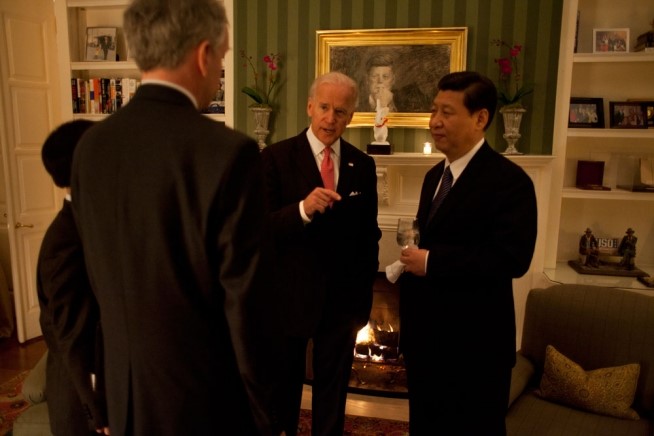The Trump administration is threatening to reverse a sweetheart deal former Vice President Joe Biden orchestrated giving Chinese companies access to U.S. capital markets because it puts the retirement accounts of millions of Americans at risk. The 2013 Biden deal gave Chinese companies access to America’s capital markets without complying with the same strict disclosure regulations required of U.S. companies.
As a result of Biden putting his thumb on the scales in favor of China, as of Feb. 2019, 156 Chinese companies were listed on U.S. exchanges with a market capitalization of $1.2 trillion, according to the U.S.-China Economic and Security Review Commission.
Under the terms of the Obama-Biden Memorandum of Understanding (MOU), which came after a series of meetings between Biden and Chinese President Xi Jinping (then-Vice President) in 2011 and 2012, U.S. regulators have very little ability to “open the kimono” and look into the books of these Chinese companies. Investors have virtually no idea what the true value of those Chinese investments are.
“There’s no telling when Biden’s ticking time bomb could blow up the retirement savings of millions of Americans,” said Rick Manning, President of Americans for Limited Government, a political advocacy group that is leading a national effort to divest private, state and federal pension funds of all Chinese companies.
“These Chinese investments could not only destabilize our economy, they also pose a national security threat because many of them are tied to the Chinese military buildup,” added Manning. “Furthermore, many Chinese companies are up to their necks in producing goods using child- and slave-labor. By allowing investments into these companies, states are effectively making individual 401(k) owners or pensioners parties to and profiteers from the exploitation of the victims of such cruel abuse.”
On Aug. 19, 2011, Xi publicly pressed Biden in Beijing, stating, “we hope the United States will eliminate the interferences of trade and investment protectionism. We hope that there will be early and concrete actions on the part of the United States on … providing a fair environment for Chinese businesses to make investment in the United States.”
To which, Biden responded, “President Obama and I, we welcome, encourage and see nothing but positive benefits flowing from direct investment in the United States from Chinese businesses and Chinese entities… we will have more good news later today about greater access and also continued development and investment both ways.”
Ultimately in May 2013, the Public Company Accounting Oversight Board (PCAOB), which is overseen by the Securities and Exchange Commission, signed off on the official MOU giving the Chinese want they wanted, as a necessary step to be listed on U.S. exchanges.
The PCAOB board was created as part of the 2002 Sarbanes-Oxley Act to help protect investors from fraudulent corporate financial reporting in the wake of the Enron corporate accounting scandal. Under the Act, all companies wishing to be traded on the U.S. stock markets must meet high standards for transparency and disclosure by subjecting auditors of U.S. public companies to external and independent oversight. Without that kind of oversight, every single one of these Chinese companies could be an Enron waiting to happen.
And now, PCAOB is warning that China is breaking the deal, stating in June, “since signing the MOU in 2013, Chinese cooperation has not been sufficient for the PCAOB to obtain timely access to relevant documents and testimony necessary to carry out our mission consistent with the core principles identified above, nor have consultations undertaken through the MOU resulted in improvements.”
Keith Krach, the U.S. Department of State’s Undersecretary for Economic Growth, told Reuters in July that the lack of transparency has prompted administration officials to lay the groundwork to exit the deal soon: “This is a National Security issue because we cannot continue to afford to put American shareholders at risk, to put American companies at a disadvantage and allow our preeminence of being the gold standard for financial markets to erode. In addition to terminating this MOU, which allows Chinese companies to openly defy U.S. laws and regulations for financial transparency and accountability, we must address the Chinese Communist Party’s exploitation of U.S. capital markets, which is a clear and ongoing risk to U.S. economic and national security.”
For those who wonder what Biden got out of the 2013 deal, it is telling that in that same year his son, Hunter Biden, became a board member at BHR Equity Investment Fund Management Company, a Chinese state-backed private equity firm, according to the New York Times and the South China Morning Post. In 2017, Hunter Biden bought 10 percent of the company for about $420,000, The Times reported.
“It appears Joe Biden used his office as vice president to enrich his family at the expense of hard-working Americans,” said Manning. “His sweetheart deal for China is a ticking time bomb could blow up Americans’ retirement pensions at any time and destabilize our economy.”
Catherine Mortensen is the Vice President of Communications at Americans for Limited Government.







